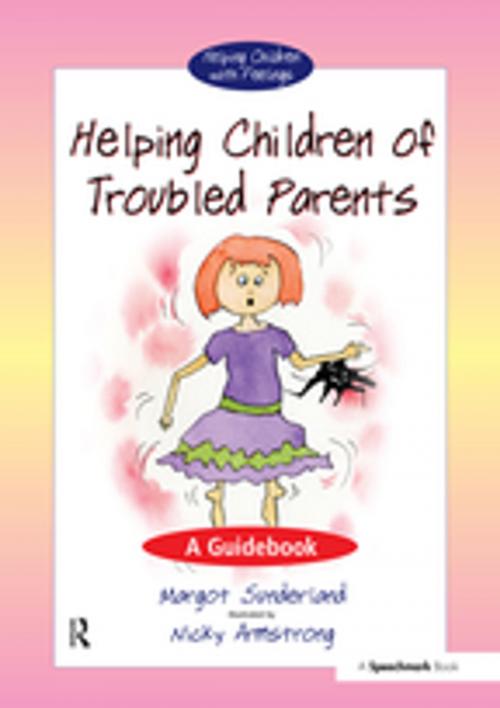Helping Children with Troubled Parents
A Guidebook
Nonfiction, Social & Cultural Studies, Political Science, Politics, Social Services & Welfare, Reference & Language, Education & Teaching| Author: | Margot Sunderland, Nicky Armstrong | ISBN: | 9781351706568 |
| Publisher: | Taylor and Francis | Publication: | April 28, 2017 |
| Imprint: | Routledge | Language: | English |
| Author: | Margot Sunderland, Nicky Armstrong |
| ISBN: | 9781351706568 |
| Publisher: | Taylor and Francis |
| Publication: | April 28, 2017 |
| Imprint: | Routledge |
| Language: | English |
This book is designed to enable practitioners to help children whose emotional wellbeing is being adversely affected by troubled parents. These are children who live with the burden of having to navigate their parent's troubled emotional states, often leaving them with a mass of painful feelings about a chaotic and disturbing world. They can feel alarmed by their parent rather than experiencing them as 'home', and a place of safety and solace. The author explores the fact that when parents are preoccupied with their own troubles, they are often unable to effectively address their child's core relational needs, e.g. soothing, validating, attunement, co-adventure, interactive play. As a result, children are left self-helping, which all too often means drugs, drink, self-harm, depression, anxiety, eating disorders or problems with anger in the teenage years. This guidebook offers readers a wealth of vital theory and effective interventions for working with these children and, specifically, the key feelings such children need help with. Particular focus is given to the effects on children of: family breakdown; separation and divorce; witnessing parents fighting; and parents who suffer from depression or anxiety, mental or physical ill-health, alcohol or drug addiction. Readers will learn: the complexity of children's feelings about their troubled parents; how to enable children to address their unspoken hurt, fear, grief, rage, and resentment about their troubled parent in order to move forward in their lives; how to empower children to find their voice when they have been left in the role of impotent bystander; effective parent-child intervention when parental troubles are adversely affecting the child; and how to help a parent and child 'find' each other again.
This book is designed to enable practitioners to help children whose emotional wellbeing is being adversely affected by troubled parents. These are children who live with the burden of having to navigate their parent's troubled emotional states, often leaving them with a mass of painful feelings about a chaotic and disturbing world. They can feel alarmed by their parent rather than experiencing them as 'home', and a place of safety and solace. The author explores the fact that when parents are preoccupied with their own troubles, they are often unable to effectively address their child's core relational needs, e.g. soothing, validating, attunement, co-adventure, interactive play. As a result, children are left self-helping, which all too often means drugs, drink, self-harm, depression, anxiety, eating disorders or problems with anger in the teenage years. This guidebook offers readers a wealth of vital theory and effective interventions for working with these children and, specifically, the key feelings such children need help with. Particular focus is given to the effects on children of: family breakdown; separation and divorce; witnessing parents fighting; and parents who suffer from depression or anxiety, mental or physical ill-health, alcohol or drug addiction. Readers will learn: the complexity of children's feelings about their troubled parents; how to enable children to address their unspoken hurt, fear, grief, rage, and resentment about their troubled parent in order to move forward in their lives; how to empower children to find their voice when they have been left in the role of impotent bystander; effective parent-child intervention when parental troubles are adversely affecting the child; and how to help a parent and child 'find' each other again.















